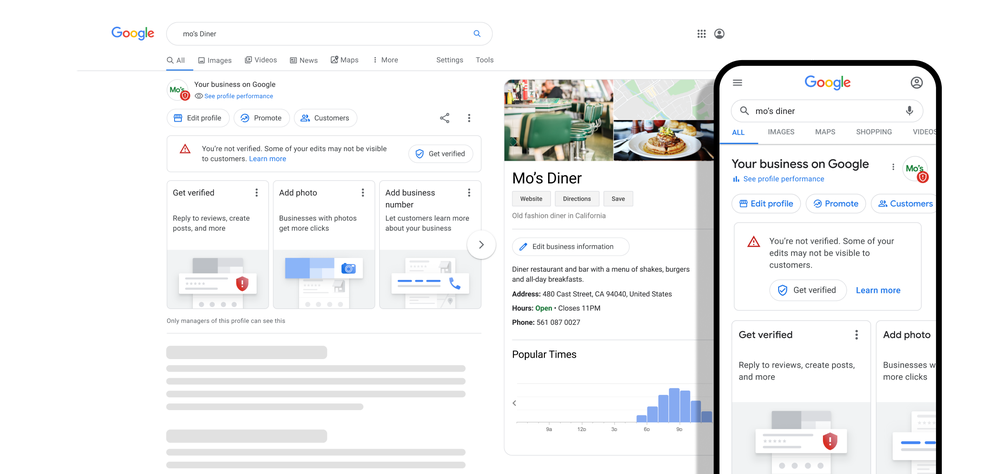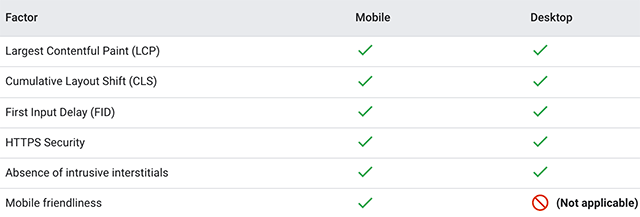Webinar Recap: Brand Loyalty Dies as Search, Social, and Reputation Converge
The Local Memo: Google My Business and Facebook for Business Are Changing Their Names

The Local Memo: Google My Business and Facebook for Business Are Changing Their Names
In this week’s update, learn about the name changes of Google My Business and Facebook for Business; the desktop version of the Page Experience update; a download milestone for Google Maps; and the pandemic impact on review sites.
Google My Business Is Changing Its Name, Again
As you’ve probably heard by now, Google My Business will be once again changing its name. This marks only the latest in several name changes during the course of Google’s history as a local search provider, most of them relating to the platform used by local business owners, and those working on their behalf, to claim and update listings. Google My Business was, until now, the longest-running name in that platform’s evolving history, but over the next few months we’ll see it gradually go away.
There will, in fact, be two (or three, depending on how you’re counting) different platforms moving forward, each with their own name. The tools SMBs will use to manage listings directly will be embedded in the Google Search interface and the Google Maps app, where many such tools have already been rolled out, and where what used to be called Google My Business will be referred to as your Google Business Profile. The Google My Business mobile app, designed for use by these same SMBs, will be discontinued sometime in 2022.
Presumably around the same time, Google will migrate the desktop GMB dashboard to a new version focused on the use case of multi-location brands, which will be called the Google Business Profile Manager. This will be one option for brands and service providers to maintain large numbers of listings, the other option being the GMB API, used primarily by listing management partners, which will continue in its current form but under the new name Business Profile API.
That’s the gist of the news, though Google did also announce a few new features in the Search interface for SMBs, such as the ability to claim and verify listings and the ability to interact with consumers using the Messages tool. The GMB dashboard still has features not present in Search or Maps, a gap Google will presumably work quickly to fill over the coming months; the company also plans to release new features and reporting not currently available in GMB.
You can read Google’s official writeup here. The news has, understandably, generated a large amount of press, including write ups from Bright Local, Search Engine Roundtable, Social Media Today, Search Engine Journal, and my own column on Street Fight.

The new Search and Maps interfaces for SMBs, courtesy Google
Facebook for Business Is Now Meta for Business
Not to be outdone in the name-changing game, Facebook, which announced two weeks ago that its new corporate entity would be known as Meta, has changed the name of Facebook for Business to Meta for Business. Unlike Google, Facebook, or Meta, has offered little in the way of additional details or news about new features, though the announcement does state: “You’ll notice some changes over the next few weeks, like updates to our design and more content on how your business can leverage our technologies to explore the metaverse, which will include exciting adventures in AR and VR.” Again referencing virtual reality, the announcement continues by saying that “we also know that what’s important to you is understanding how to grow your business across Facebook, Messenger, Instagram, WhatsApp and Quest. And we’re here to help.” The inclusion of Quest — Meta’s Oculus VR headset — is an interesting hint towards what may be coming to Facebook’s suite of business marketing tools. Perhaps the metaverse is on its way toward becoming a marketing reality sooner than we might have anticipated.
Desktop Version of Page Experience Update Slated for February 2022
Google has announced that the same Page Experience metrics launched over the summer for the mobile web will be coming to desktop, with a second phase of the Page Experience update slated to launch in February 2022 and to continue until the end of March — about the same duration as the mobile version, which began in mid-June of this year and lasted until the end of August. All of the same Page Experience metrics will apply to desktop, with the exception of mobile friendliness. Most importantly, the new Core Web Vitals metrics — Largest Contentful Paint, Cumulative Layout Shift, and First Input Delay — will for the first time be used as ranking signals for desktop web pages. Google Search Console is slated to include a desktop version of Page Experience reporting in advance of the rollout. Google is again stating that Page Experience for desktop, as for mobile, will have only a modest impact on ranking.

Courtesy Search Engine Roundtable
Google Maps Reaches 10 Billion Play Store Downloads
Google Maps has achieved a significant milestone, having hit 10 billion downloads on the Google Play Store — a number larger than the population of the planet. The app is in select company; it’s only the third Android app in history to reach that figure, behind Google Play services (July 2020) and YouTube (July 2021). Remarkably, the install base for Google Maps on Android devices has doubled in less than three years, having hit 5 billion downloads in March 2019. There’s speculation that the Google Search app could be the next to reach seven figures.
The Pandemic Impact on Review Sites
A recent Washington Post article discusses the impact of the COVID-19 pandemic on review sites like Google, TripAdvisor, Yelp, and Expedia. With a focus on travel needs, the article highlights Google’s new tools that help travelers understand immunization requirements and advisories or restrictions in place at their destination, as well as regional COVID case counts in Google Maps and alerts for drivers and those taking public transportation. TripAdvisor launched a Travel Safe suite of features last year allowing hotels and restaurant owners to share their safety practices and requirements, as well as search filters to help consumers find businesses with desired safety features. This year, TripAdvisor launched vaccination information for business profiles, including policies for employee vaccination as well as whether proof of vaccination is required for customers.
Expedia has several Google-like features to aid travelers, and Yelp, like TripAdvisor, has a comprehensive list of health and safety practices for businesses as well as search filters for consumers to find a business that meets their health and safety needs. Yelp is also watching closely for evidence that businesses are being unfairly targeted for their health and safety policies, having removed more than 8,300 reviews from its platform this year due to violations of review policy related to the pandemic.




